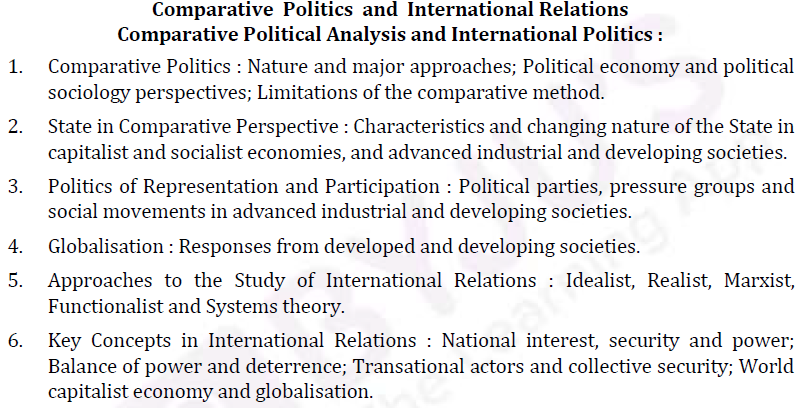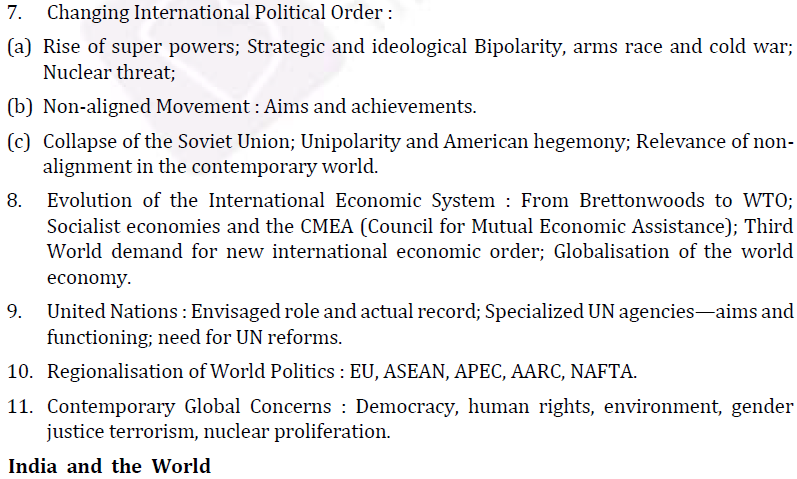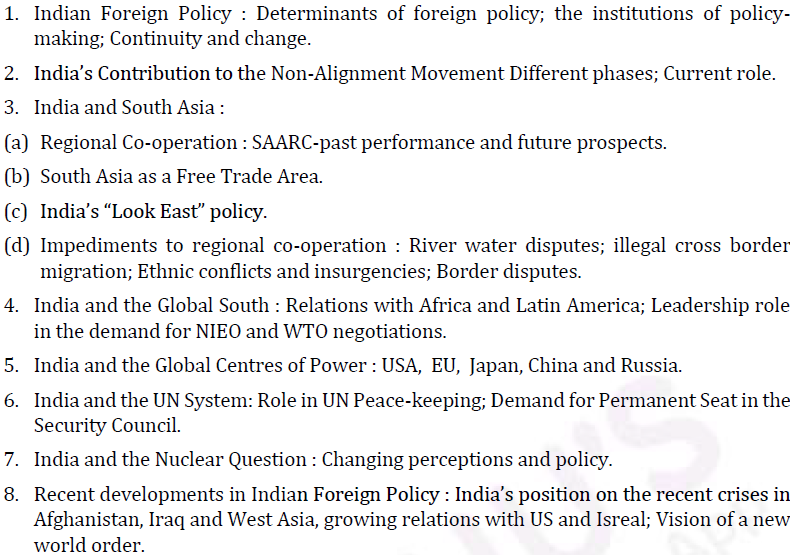Political Science Optional consists of 2 papers (Paper I and Paper II) in the UPSC Civil Services Mains Examination. Each paper is of 250 marks with a total of 500 marks.
I Political Theory and Indian Politics:
- Political Theory: meaning and approaches.
- Theories of state: Liberal, Neo-liberal, Marxist, Pluralist, post-colonial and Feminist.
- Justice: Conceptions of justice with special reference to Rawl's theory of justice and its communitarian critiques.
- Equality: Social, political and economic; relationship between equality and freedom; Affirmative action.
- Rights: Meaning and theories; different kinds of rights; Concept of Human Rights.
- Democracy: Classical and contemporary theories; different models of democracy—representative, participatory and deliberative.
- Concept of power: hegemony, ideology and legitimacy.
- Political Ideologies: Liberalism, Socialism, Marxism, Fascism, Gandhism and Feminism.
- Indian Political Thought: Dharamshastra, Arthashastra and Buddhist Traditions; Sir Syed Ahmed Khan, Sri Aurobindo, M. K. Gandhi, B. R. Ambedkar, M. N. Roy.
- Western Political Thought: Plato, Aristotle, Machiavelli, Hobbes, Locke, John S. Mill, Marx, Gramsci, Hannah Arendt.
Indian Government and Politics
1. Indian Nationalism:
(a) Political Strategies of India’s Freedom Struggle: Constitutionalism to mass Satyagraha, Non-cooperation, Civil Disobedience; Militant and Revolutionary Movements, Peasant and Workers Movements.
(b) Perspectives on Indian National Movement; Liberal, Socialist and Marxist; Radical Humanist and Dalit.
2. Making of the Indian Constitution: Legacies of the British rule; different social and political perspectives.
3. Salient Features of the Indian Constitution: The Preamble, Fundamental Rights and Duties, Directive Principles; Parliamentary System and Amendment Procedures; Judicial Review and Basic Structure doctrine.
4. (a) Principal Organs of the Union Government: Envisaged role and actual working of the Executive, Legislature and Supreme Court.
(b) Principal Organs of the State Government: Envisaged role and actual working of the Executive, Legislature and High Courts.
5. Grassroots Democracy: Panchayati Raj and Municipal Government; Significance of 73rd and 74th Amendments; Grassroot movements.
6. Statutory Institutions/Commissions: Election Commission, Comptroller and Auditor General, Finance Commission, Union Public Service Commission, National Commission for Scheduled Castes, National Commission for Scheduled Tribes, National Commission for Women, National Human Rights Commission, National Commission for Minorities, National Backward Classes Commission.
7. Federalism: Constitutional provisions; changing nature of centre-state relations; integrationist tendencies and regional aspirations; inter-state disputes.
8. Planning and Economic Development: Nehruvian and Gandhian perspectives; Role of planning and public sector; Green Revolution, land reforms and agrarian relations; liberalization and economic reforms.
9. Caste, Religion and Ethnicity in Indian Politics.
10. Party System: National and regional political parties, ideological and social bases of parties; Patterns of coalition politics; Pressure groups, trends in electoral behaviour; changing socio-economic profile of Legislators.
11. Social Movement: Civil liberties and human rights movements; women’s movements; environmentalist movements.







0 Comments